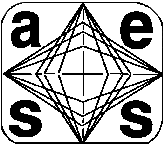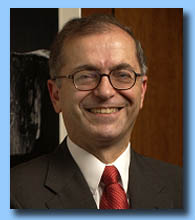![]()

April 24 - 27, 2006
Turning Stone Resort and Casino
Verona, NY USA
Tuesday, April 25, 2006
 |
|
Dr. Charles Elachi
|
|
Dr.
Charles Elachi
Director, NASA's Jet Propulsion Laboratory California Institute of Technology |
||
|
THE LEGACY & FUTURE OF CIVILIAN RADAR MISSIONS Abstract: Civilian spaceborne radar remote sensing activities started at Jet Propulsion Laboratory in 1960 as NASA was being formed, when JPL developed a rocket-based L-band radar to measure the characteristics of Earth analogues to the surfaces of Moon and Venus. Since then, NASA has explored the depth and breadth of the solar system using radar techniques that exploit the diversity of electromagnetic waves - spectral band, bandwidth, waveform coding, polarization, interferometric phase - as well as observational geometry and temporal sampling. The Shuttle Imaging Radar-C, flown in 1994, used C-band and L-band fully polarimetric synthetic aperture radars as well as X-band to characterize the Earth in a wide variety of disciplines, including land cover and biodiversity, geology and geophysics, and ocean and coastal properties. SIR-C led to the Shuttle Radar Topography Mission, a C-band ScanSAR interferometer that mapped the topography of the Earth in 10 days. In planetary remote sensing, Magellan mapped the surface of Venus in the early 1990's using an S-band circularly polarized burst-mode radar system, creating the first complete map of any planetary body, including Earth. These discoveries, made possible by radars highly tailored to specific needs in understanding and characterizing solar system bodies, are changing the way we view the terrestrial planets and their evolution. Biography: Dr. Charles Elachi is the Director of the Jet Propulsion Laboratory and Vice President of the California Institute of Technology. He has been a principal investigator on a number of research and development studies and flight projects sponsored by the National Aeronautics and Space Administration. These include the Shuttle Imaging Radar series (Science Team Leader), the Magellan Imaging Radar (Team Member), and the Cassini Titan Radar (Team Leader). In 1989, Dr. Elachi was elected to the National Academy of Engineering and has served on a number of academy committees. He is a fellow of the IEEE and AIAA and a member of the National Academy of Engineering and the International Academy of Astronautics. . Dr. Elachi received the B.Sc. ('68) in Physics from University of Grenoble, France; the Dipl. Ing. ('68) in Engineering from the Polytechnic Institute, Grenoble and the M.Sc. ('69) and Ph.D. ('71) degrees in electrical sciences from the California Institute of Technology, Pasadena. |